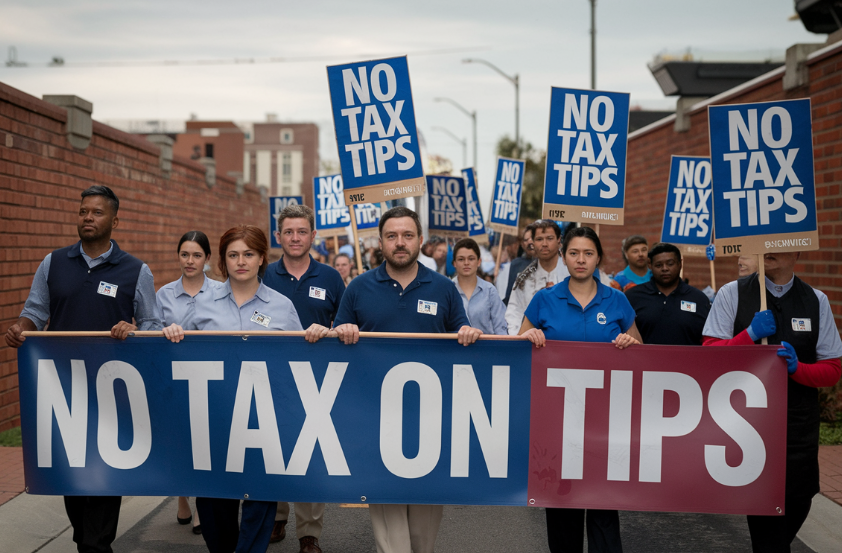Breaking News
Republicans and Dems Support the No Tax On Tips Proposal, But Is It the Right Call?

The “No Tax on Tips” proposal has emerged as a rare point of agreement between Republicans and Democrats, both of whom see it as a way to support service industry workers. The policy aims to eliminate federal taxes on tips, allowing workers to keep more of their earnings. However, the proposal has sparked a broader debate over its potential economic impact and the complexity it might introduce to the tax system.
A Short History of Tipping
America's service workers' salaries have long been supplemented by tips due to a historical reliance on gratuity-based income as a significant component of their earnings. This practice dates back to the post-Civil War era when tipping became more widespread in the U.S., influenced by European customs. Over time, employers in the service industry, particularly in restaurants and hospitality, began to exploit this system by paying workers below the minimum wage, assuming that tips would make up the difference.
The federal subminimum wage for tipped workers, established by the Fair Labor Standards Act in 1938 and set at $2.13 per hour since 1991, further entrenched this system. As a result, service workers' incomes are heavily dependent on the generosity of customers, leading to income instability and a reliance on tips to reach a livable wage. This reliance has been criticized for perpetuating wage inequality and placing an undue burden on consumers to directly subsidize workers' pay.
Republicans Back No Tax on Tips
Republicans, particularly under the leadership of Donald Trump, have strongly supported the “No Tax on Tips” initiative. In a recent rally, Trump stated, “This is about fairness. We're ensuring that the American worker isn't penalized for earning a tip.” They argue that the proposal aligns with their broader goals of reducing taxes and government intervention. By exempting tips from federal taxation, Republicans believe the policy will simplify tax reporting for service workers and increase their take-home pay. This, in turn, could boost worker morale and incentivize better performance in the service industry.
Democrats Also Support the Proposal, But With Reservations
On the Democratic side, figures like Kamala Harris have also thrown their support behind the policy, recognizing its potential appeal to working-class voters. Harris noted that this policy would “put more money in the pockets of those who need it most, without adding to their tax burden.” In states like Nevada, where the service industry is a significant part of the economy, Democrats see this policy as a way to connect with voters who feel the economic squeeze. However, some Democrats remain concerned about the possible loss of tax revenue and the potential for the policy to disproportionately benefit higher earners within the tipping economy.
Other Industry Players React to Economic Concerns
While the policy has garnered broad political support, it has also raised concerns among economists and industry experts. A significant worry is that the exemption of tips from taxation could encourage businesses to shift more of their compensation structure to a tip-based model. This shift could lead to wage reductions for workers, particularly if employers use the policy as a means to pay lower base wages. Additionally, the estimated cost of implementing the policy ranges from $100 billion to $250 billion over the next decade, leading some to question its long-term viability.
Furthermore, critics argue that the policy is poorly targeted, benefiting only a small segment of the workforce while potentially adding unnecessary complexity to the tax system. The risk of businesses and high-income professionals finding ways to exploit the policy adds to these concerns, prompting calls for careful consideration of potential safeguards.
Voter Reactions and Future Implications
In Las Vegas, a city heavily reliant on tipped workers, the response has been mostly positive. One casino worker commented, “This policy could really help us out. Every dollar counts when you're living on tips.” However, the broader implications of the policy remain a topic of debate, particularly among those concerned about its impact on tax revenue and wage structures.
As the 2024 election cycle heats up, the “No Tax on Tips” proposal is expected to remain a hot topic. With strong backing from service industry workers and bipartisan support, this policy could significantly influence voter decisions in key states.
Do you support the No Tax on Tips proposal? More to the point, do you also support a tip-based service industry instead of regular wages? Tell us what you think about these policies.
